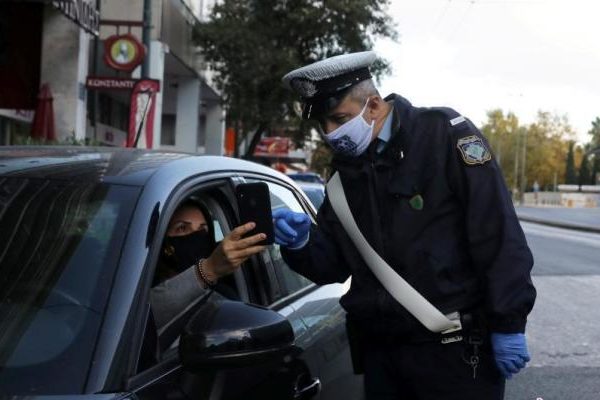December 1 According to a report by the Greek Times, on November 30, local time, the Greek National Public Health Organization (EODY) announced that 1,044 new confirmed cases of COVID-19 in Greece, with a total of 105,271 confirmed cases; 85 new deaths, with a total of 2,406 deaths. On the same day, Greek Prime Minister Mizotakis said that the epidemic had slightly improved through a series of restrictions.
Mizotakis also said that there are signs that the pressure on the public health system in the north is gradually reducing. However, he added: “There is no denying that we will have a difficult time to go forward. We will start to discuss how to lift the blockade from now on. But we focus on scientific data, not on specific times.”
On November 7th, local time, in Athens, Greece, a policeman was checking the driver’s documents to determine the purpose of his trip. In order to contain the coronavirus epidemic, Greece has entered a three-week blockade since 6 a.m. local time on the 7th. The new restrictions will prohibit interregional travel.
Mizotakis also said that if epidemiological data show that the epidemic situation is still not ideal, the possibility of extending the blockade cannot be ruled out. Because the government’s goal is to do everything possible to ensure the health of the people before the vaccine arrives. He pointed out that if the first batch of coronavirus vaccines can be approved by relevant European agencies in the near future, they are expected to arrive in Greece by the end of 2020.
On the same day, the Greek Ministry of Development and Investment also announced that it would produce a self-developed rapid nucleic acid test kit for the first time. A patent for the test equipment is being applied for, and a company is looking for the ability to produce this test kit. When this test kit is put into use, it can greatly improve the ability of health authorities to test for COVID-19 on a large scale.
According to the introduction, this detection device can accurately detect the novel coronavirus within 30 minutes. Its trademark name is IRIS, which is portable, fast, accurate and low-cost. The coronavirus test of Pasteur Institute in Greece showed 97.4% sensitivity, which is more accurate than commercial tests at the same cost.
After completing the sample collection, the device can also transfer the results directly to the mobile phone or tablet through wireless connection and related software. It is worth noting that in addition to being used for COVID-19 testing, IRIS can also be used to detect other infectious diseases, such as hepatitis, respiratory infections, etc.
The IRIS research team is composed of multiple interdisciplinary experts. The team’s research on biosensors began in 2010. Before the arrival of the novel coronavirus, they had identified equipment and detection methods for identifying genetic materials. After the outbreak, the team quickly turned its research direction to the need for rapid detection of COVID-19.



